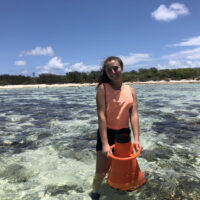Elizabeth Buccheri
PhD Candidate
University of Queensland

From 2005 to 2022, the main node of the ARC Centre of Excellence for Coral Reef Studies was headquartered at James Cook University in Townsville, Queensland (Australia)








Elizabeth is a PhD candidate at the University of Queensland under the supervision of Prof. Peter Mumby and Dr. Christopher Doropoulos. Her research is focused on identifying critical population thresholds to maximise coral recovery on the Great Barrier Reef to guide effective conservation and restoration initiatives in the future. Her experiences with field based research, experimental design, statistical analysis, and modeling will help her achieve her research objectives.
Elizabeth obtained her Bachelors degree in Environmental Studies at Adelphi University in New York in 2018. During this time, she worked as a laboratory assistant in a marine geology laboratory and a teaching assistant for a marine science institute. She also led a project assessing how sea cucumber behaviour was influenced by ocean warming in the southern GBR and was able to publish this work in the Journal of Marine Biology in 2019. She received her Masters in Conservation Science from the University of Queensland in 2020, where she conducted a research thesis which sought to guide more robust site selection for future reef restoration initiatives on the GBR to minimise the likelihood of damage via tropical cyclones.
New DNA techniques are being used to understand how coral reacted to the end of the last ice age in order to better predict how they will cope with current changes to the climate. James Cook Univer
A new study on the effects of climate change in five tropical countries has found fisheries are in more trouble than agriculture, and poor people are in the most danger. Distinguished Profess
James Cook University researchers have found brightly coloured fish are becoming increasingly rare as coral declines, with the phenomenon likely to get worse in the future. Christopher Hemingson, a
Researchers working with stakeholders in the Great Barrier Reef region have come up with ideas on how groups responsible for looking after the reef can operate more effectively when the next bleaching
Abstract: As marine species adapt to climate change, their heat tolerance will likely be under strong selection. Individual variation in heat tolerance and its heritability underpin the potential fo
Abstract: The Reef Ecology Lab in KAUST’s Red Sea Research Center explores many aspects of movement ecology of marine organisms, ranging from adult migrations to intergenerational larval dispersal
Abstract: Macroalgal meadows are a prominent, yet often maligned component of the tropical seascape. Our work at Ningaloo reef in WA demonstrate that canopy forming macroalgae provide habitat for ad
Abstract: Sharks are generally perceived as strong and fearsome animals. With fossils dating back at least 420 million years, sharks are not only majestic top predators but they also outlived dinosa
Abstract: Connectivity plays a vital role in many ecosystems through its effects on fundamental ecological and evolutionary processes. Its consequences for populations and metapopulations have been
Abstract: Evolution of many eukaryotic organisms is affected by interactions with microbes. Microbial symbioses can ultimately reflect host’s diet, habitat range, and even body shape. However, how
Abstract: The past few years have seen unprecedented coral bleaching and mortality on the Great Barrier Reef (GBR) but the consequences of this on biodiversity are not yet known. This talk will expl